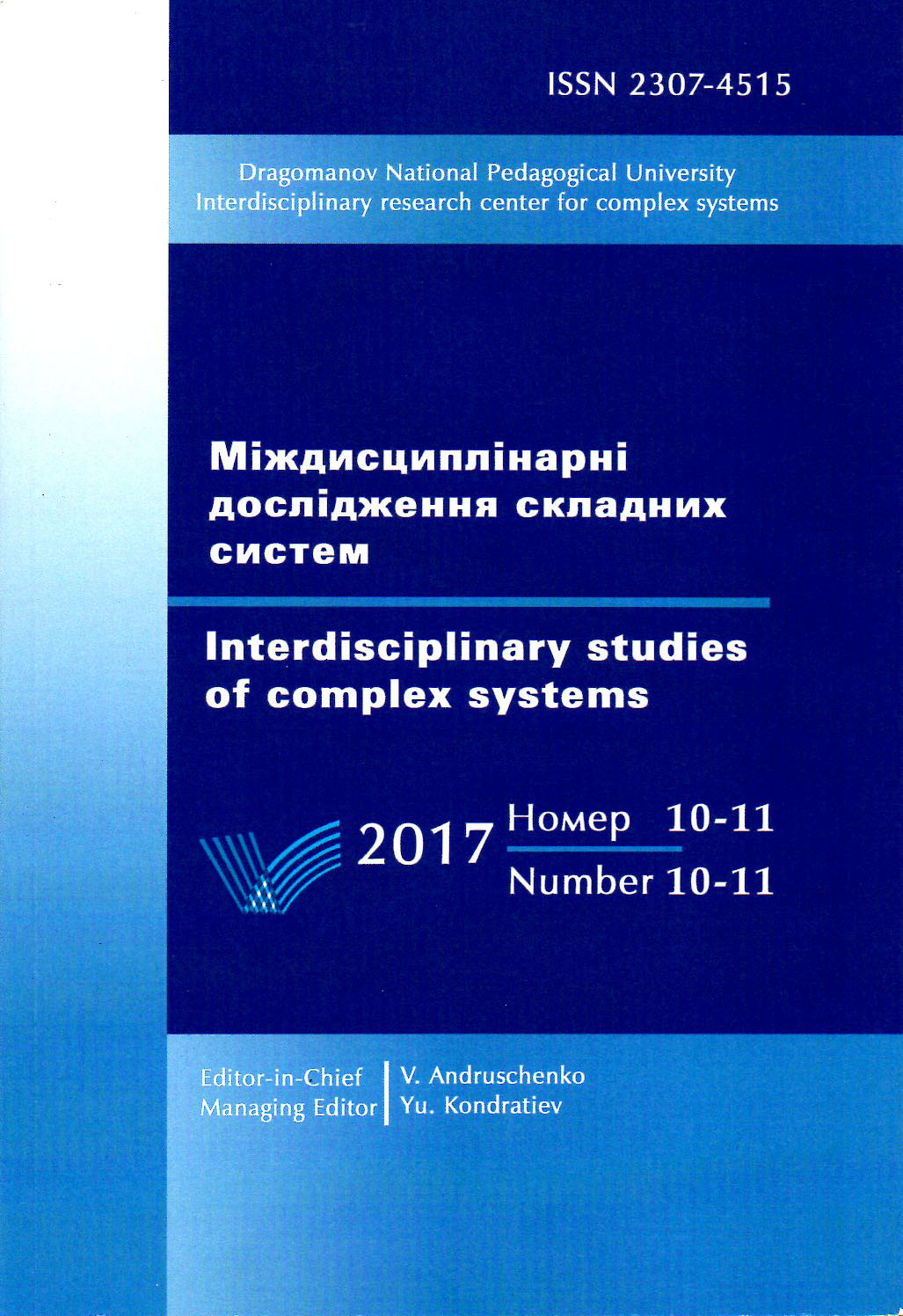Interdisciplinary links as a didactic basis of the future teacher’s professional training
DOI:
https://doi.org/10.31392/2307-4515/2017-10-11.3Анотація
In the article, the authors consider interdisciplinary links as an important factor in training students of higher pedagogical educational establishments for their future professional activities. As a result of the study and analysis of pedagogical experience, the researchers found that interdisciplinary links are the didactic principle and the basis for the formation of methodological knowledge. These connections are also considered as conditions for the formation of the outlook and the improvement of professional training of future specialists; they are means of increasing the efficiency of knowledge acquisition, activating cognitive activity, forming cognitive needs and developing a system type of thinking, etc. The attention is paid to the technology of implementation of interdisciplinary links in higher pedagogical education, which makes it possible to make the learning process of future teachers efficient. In the pedagogical practice, it became clear that the systematic nature of vocational and pedagogical knowledge involves an interdisciplinary synthesis of these knowledge. Students need to master the concepts, necessary skills and abilities within this knowledge system (system of philosophical knowledge, system of psychological knowledge, system of pedagogical knowledge, system of historical knowledge, system of knowledge in subjects that are profiling in the department, etc.). An analysis of the content of curricula, textbooks, manuals on a number of subjects enabled the authors to find out that interdisciplinary orientation in teaching philosophy, political science, sociology, economic theories, psychology, pedagogy and teaching methods of a particular discipline in the context of interdisciplinarity offers some extra opportunities for the formation of the system of professional and pedagogical knowledge of the future teachers, provides opportunities for mastering the methods of cognition, which prompts for a scientific understanding of the tasks of pedagogy, the issue of education and upbringing of the younger generation, understanding the state policy in the education area. As a result of the analysis and comparison of the contents of the curriculum, the sections, the topics and the separate questions that were adjacent to the indicated disciplines were identified. It allowed determining the content of interdisciplinary knowledge. Implementation of multifunctional interdisciplinary connections in the educational process affects the ideological orientation of a future teacher, the mastery of the dialectical method of cognition, the formation of a professional type of thinking and methodological culture.Посилання
Abdullina, O. A. (1990). Obshchepedagogicheskaia podgotovka uchitielia v sisteme vysshego pedagogicheskogo obrazovania [General Pedagogical Education of a Teacher in the System of Higher Pedagogical Training]. Moscow: Prosvieshcheniie.
Augsburg, T., Bekken, B. M., Hovland, K., Klein, J.T., Luckie D.B., Madison B.L., Martin P. J. S. et al. (2013). Insights on Interdisciplinary Teaching and Learning. White Paper. Edited by Aaron M. McCright and Weston Eaton. Available at lbc.msu.edu/CITL/whitepaper.cfm. East Lansing, MI: Michigan State University. Retrieved from http://lbc. msu.edu/faculty_staff/CITL%20White%20Paper.pdf
Benefits of Interdisciplinary Teaching and Learning. "Toolkit" for Interdisciplinary Learning, Teaching, Assessment. Retrieved from http:// apcentral.collegeboard.com/apc/public/repository/AP-Interdis ciplinary-Teaching-and-Learning-Toolkit.pdf
Interdisciplinary Learning (2005). Elements of Effective Teaching Practice. Knowledge and Employability Studio. Alberta Education, Alberta, Canada. Retrieved from http://www.learnalberta.ca/content/kes/pdf/ or_ws_tea_elem_05_interdis.pdf
Interdisciplinary Learning (2012). CfE Briefing. 2012, September. Retrieved from https://education.gov.scot/Documents/cfe-briefing-4.pdf
Komenskiy, Ya. A. (1955). Izbrannye pedagogicheskie sochinenia [Selected Pedagogical Papers]. Moscow: Uchpedgiz.
Kremen, V. H. (2009). Filosifiia liudynocentryzmu v stratehiiah osvitnioho prostoru [Philosophy of Human-Centeredness in the Strategies of Educational Space]. Kyiv: Pedahohichna dumka.
Pestalocci, I. G. (1963). Izbrannye pedagogicheskie proizvedenia [Selected Pedagogical Papers]. Moscow: Izd-vo APN RSFSR.
Rau, I. A. (1985). Hegel’s Views on the Correlation between Theoretical and Practical Cognition of Reality. Voprosy filosofii. 2, 114-123.
Spear, G. E., Mocker, D. W. (1984). The organizing circumstance: Environmental determinants in self-directed learning. Adult Education Quarterly, 35.
Spivakovskiy, A.V., Petukhova, L.Ye., Kravcov, G.M., Voropay, N.A., Kotkova, V. V. (2016). Novaia didaktika: ot subiekt-subiektnykh — k tri-subiektnym otnosheniam [New Didactics: from Subject-Subject to Three-Subject Reations] (ed. A. V. Spivakovskiy). Kherson, Ukraine.
Styron, Ronald A., Jr. (2013). Interdisciplinary Education: A Reflection of the Real World. Systemics, cybernetics and informatics. Vol. 11, No. 9, 47-52. Retrieved from http://www.iiisci.org/journal/CV$/sci/pdfs/ iSA312DD.pdf
Ushinskiy, K. D. (1949). O pervonachalnom prepodavanii russkogo yazyka [On the Original Teaching of the Russian Language]. (11 vols, vol. 5). Moscow-Leningrad. Russia: Izd-vo APN RSFSR.
##submission.downloads##
Опубліковано
Номер
Розділ
Ліцензія
Автори, які публікуються у цьому журналі, погоджуються з наступними умовами:- Автори залишають за собою право на авторство своєї роботи та передають журналу право першої публікації цієї роботи на умовах ліцензії Creative Commons Attribution License, котра дозволяє іншим особам вільно розповсюджувати опубліковану роботу з обов'язковим посиланням на авторів оригінальної роботи та першу публікацію роботи у цьому журналі.
- Автори мають право укладати самостійні додаткові угоди щодо неексклюзивного розповсюдження роботи у тому вигляді, в якому вона була опублікована цим журналом (наприклад, розміщувати роботу в електронному сховищі установи або публікувати у складі монографії), за умови збереження посилання на першу публікацію роботи у цьому журналі.
- Політика журналу дозволяє і заохочує розміщення авторами в мережі Інтернет (наприклад, у сховищах установ або на особистих веб-сайтах) рукопису роботи, як до подання цього рукопису до редакції, так і під час його редакційного опрацювання, оскільки це сприяє виникненню продуктивної наукової дискусії та позитивно позначається на оперативності та динаміці цитування опублікованої роботи (див. The Effect of Open Access).











